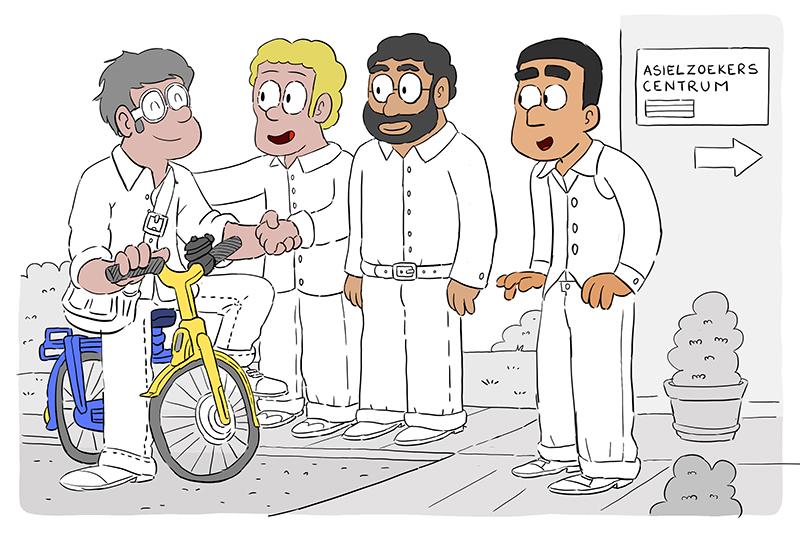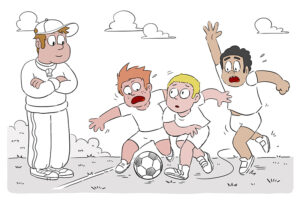
Zayed has been asked to help with a member of parliament’s visit to the asylum seekers’ center. His job is to welcome the politician, Freek van Balen, at the gate and show them the way to the reception desk. Mr. van Balen arrives on a blue-and-yellow OV bike, dressed in jeans, sneakers, and a windbreaker.
Zayed is puzzled. “Is that the politician we are waiting for? Without a car? How strange that the man comes on a bicycle and also in jeans. Inappropriate! That can’t be a strong, respected leader, can it? Then why is the director of our AZC acting so happy and there are even journalists?”
Freek van Balen is always happy when he goes on a working visit. He has migration in his portfolio and visits an asylum seekers’ center somewhere in the country every month. He values traveling via public transport and, if possible, taking a bike when he arrives at the station: “Hey, how nice to ride a bike and how handy those OV bikes you can rent at the station are!”
He is also glad he put on his jeans. “I wouldn’t feel at all comfortable in a neat suit when the refugees already have so little,” he says. In that respect, he does not envy his predecessor Simon. Who became a minister and has a service car. And a lot less freedom of movement, always in suits. Everyone chooses his own style.
Where is the connection?
Zayed comes from a hierarchical society and is used to a leader clearly displaying his success and status with expensive cars and fancy clothes. That image commands respect, and vice versa, the hosts also feel more respected when an important person presents himself in that way. The latter aspect in particular is quite often overlooked in the Netherlands. That van Balen misjudged that.
The Netherlands is very egalitarian and it is not that leaders lose their prestige because of their choice of clothing or means of transportation. They dress according to the occasion and in this case the politician does not want to stand out too much among the migrants. Equality is important. He thinks the migrants will feel more comfortable if he dresses casually. In addition, he is convinced that his message is more important than what he is wearing. Moreover, the location is easy to reach by bicycle, and efficiency is more important than status here.
The big question is always, who adapts. The politician does not have to adapt. We are in the Netherlands. But still…
Freek van Balen is not going to the AZC for the show. At least, one would hope so. He wants to talk to the asylum seekers. They are full of expectations and expect a leader who can represent their interests. Trust has yet to be built.
Clothing is part of communication, especially in indirect communication where a lot is told with gestures, clothing and other things.
The politician must take that into account. With mutual respect comes formal dress. A suit, in other words. Then the tie can stay off. Or, as I have often experienced in Asia, leave the jacket at home and wear the tie, especially when it is warm.
Then the politician meets his audience and shows respect.
Besides, we are very individualistic in our attitude. So it’s our own choice. That also makes it very confusing for us, and especially for newcomers.
And the bicycle? That’s almost Dutch folklore. In many cultures, a leader on a bicycle is unthinkable.
In short
For Freek van Balen:
- Accept that Zayed and other asylum seekers mostly come from a hierarchical society.
- Respect is also given and shown in the choice of clothing.
- Be aware of the impact your way of communicating makes on your hearing. That includes clothing and means of transportation.
- Behind the smile and welcome are many emotions. Be alert to body language.
For Zayed:
- Accept that Dutch society is egalitarian and informal.
- Clothing is an individual choice and nothing is often meant by it.
- What is said is more important than how it is said.
- Make use of the idea that the politician is also accessible.
Want to read more about culture dimensions?
Important to know
This anecdote is based on stories shared with us. Connect2Us strives to highlight the dilemma from both sides and not to label people or suggest that one or the other should behave differently. We see in our daily intercultural work that awareness by those involved is enough to move toward each other without pretending to be very different. Connect2Us aims to help readers recognize and avoid prejudice. Read about prejudice, discrimination and racism here.

